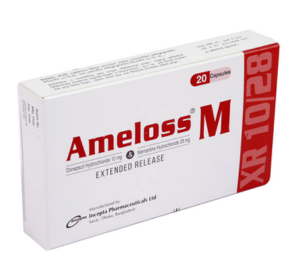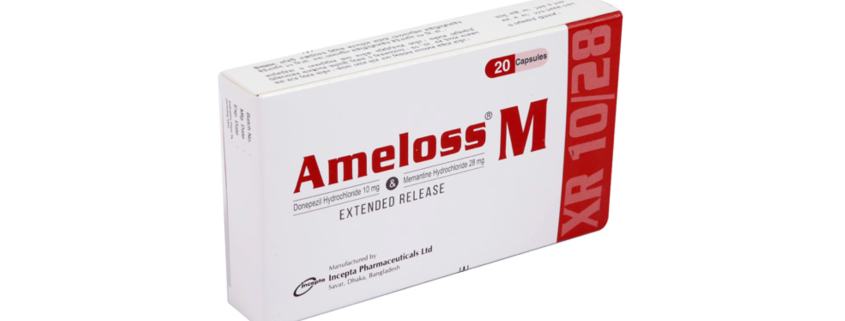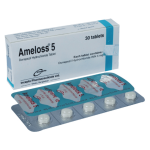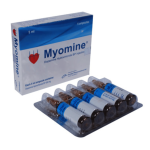Ameloss M(Donepezil Hydrochloride & Memantine Hydrochloride)

Therapeutic Group: Anti Alzheimer
Presentation
Ameloss M XR 10/7: Each extended-release capsule contains Donepezil Hydrochloride USP 10 mg and Memantine Hydrochloride USP 7 mg
Ameloss M XR 10/14: Each extended-release capsule contains Donepezil Hydrochloride USP 10 mg and Memantine Hydrochloride USP 14 mg
Ameloss M XR 10/28: Each extended-release capsule contains Donepezil Hydrochloride USP 10 mg and Memantine Hydrochloride USP 28 mg
Description
Donepezil and Memantine hydrochloride extended-release capsules are a combination contains donepezil, a reversible inhibitor of the enzyme acetylcholinesterase, as the hydrochloride salt and memantine, an orally active NMDA receptor antagonist, as the hydrochloride salt.
Indications
Indicated for the treatment of moderate to severe dementia of the Alzheimer’s type in patients stabilized on 10 mg of donepezil hydrochloride once daily.
Dosage & Administration
For patients stabilized on Donepezil hydrochloride (10 mg) only: The recommended starting dose of donepezil and memantine hydrochlorides extended-release capsules is 10 mg/7 mg, taken once daily in the evening. For the recommended maintenance dose of 10 mg/28 mg the dose of memantine hydrochlorides should be increased to weekly 7 mg. The minimum recommended interval between dose increases is one week.
For patients stabilized on Memantine hydrochloride (10 mg twice daily or 28 mg extended-release capsule once daily) and Donepezil hydrochloride (10 mg once daily): Can be switched to donepezil and memantine hydrochlorides extended- release capsules 10 mg/28 mg, taken once daily in the evening.
Patients with renal impairment: The recommended starting dose of donepezil and memantine hydrochlorides extended-release capsules is 10 mg/7 mg, taken once daily in the evening. The recommended maintenance dose for donepezil and memantine hydrochlorides extended-release capsules is 10 mg/14 mg once daily in the evening.
Patients with hepatic impairment: No dosage adjustment is needed in patients with mild or moderate hepatic impairment. Donepezil and memantine hydrochlorides extended-release capsules has not been studied in patients with severe hepatic impairment.
Side Effects
The most common adverse reactions, occurring at a frequency of at least 5% and greater than placebo with memantine hydrochloride extended-release 28 mg/day, were headache, diarrhea, and dizziness. The most common adverse reactions occurring at a frequency of at least 5% in patients receiving donepezil and at twice or more the placebo rate, include diarrhea, anorexia, vomiting, nausea, and ecchymosis.
Precautions
Donepezil and memantine hydrochlorides extended-release is likely to exaggerate succinylcholine-type muscle relaxation during anesthesia, may have vagotonic effects on the sinoatrial and atrioventricular nodes manifesting as bradycardia or heart block, besides can cause diarrhea, nausea, and vomiting, may cause bladder outflow obstructions, monitor patients for symptoms of active or occult gastrointestinal bleeding, especially those at increased risk for developing ulcers, conditions that raise urine pH may decrease the urinary elimination of memantine, resulting in increased plasma levels of memantine.
Use in Pregnancy & Lactation
Pregnancy: There are no adequate data on the developmental risk associated with the use of donepezil and memantine hydrochlorides extended-release capsules or its active ingredients (donepezil hydrochloride and memantine hydrochloride) in pregnant women.
Lactation: There are no data on the presence of memantine or donepezil in human milk, the effects on the breastfed infant, or the effects of donepezil and memantine hydrochlorides extended-release capsules or its metabolites on milk production.
Drug Interaction
Drugs that make the urine alkaline, NMDA antagonists, Anti-cholinergic, Cholinomimetics and other cholinesterase inhibitors.
Over Dose
No specific antidote for memantine hydrochloride overdose is known; however, elimination of memantine can be increased by acidification of the urine. Tertiary anticholinergics such as atropine may be used as an antidote for donepezil hydrochloride overdose. In managing cases of overdose, consider the possibility of multiple drug involvement. In general, supportive measures should be utilized, and treatment should be symptomatic.
Storage
Do not store above 30 °C. Keep away from light and out of the reach of children.
Commercial Pack
Ameloss M XR 10/7: Each box containing 2 blister strips of 10 capsules.
Ameloss M XR 10/14: Each box containing 2 blister strips of 10 capsules.
Ameloss M XR 10/28: Each box containing 2 blister strips of 10 capsules.



